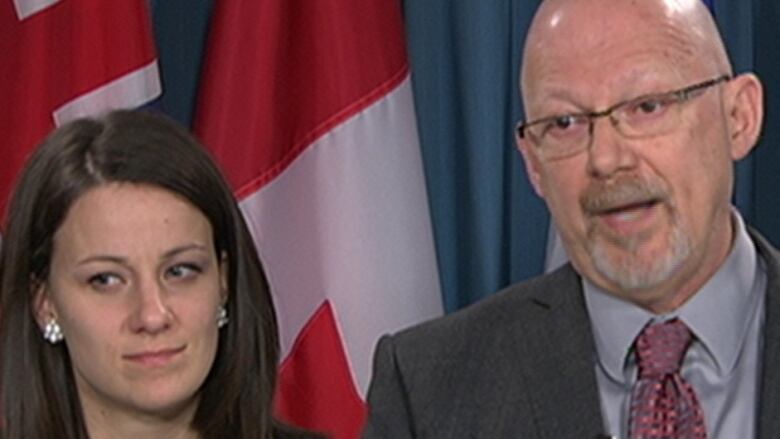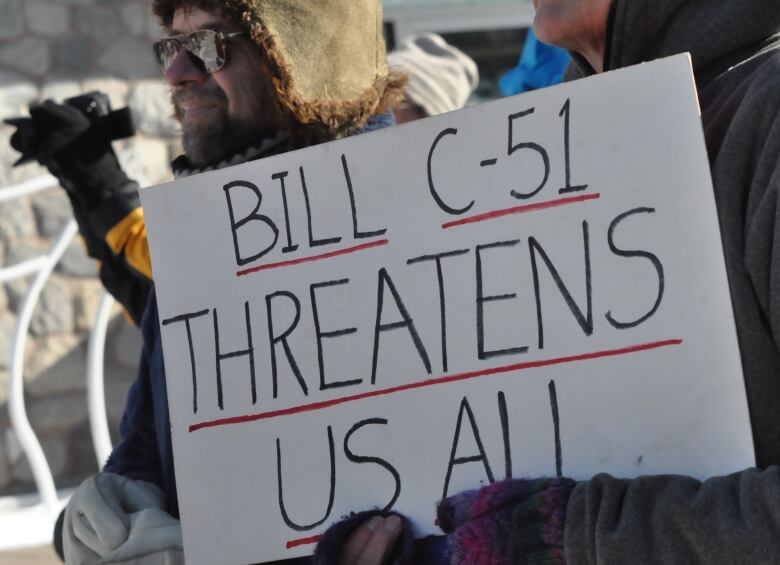Bill C-51: NDP outlines plan to scrap 'dangerous provisions'
'This is a dangerous, ineffective bill that should not be adopted,' says NDP public safety critic

The government's proposed anti-terror legislation would be stripped of "dangerous" measures that would increase the power and scope of the Canadian Security Intelligence Service under the amendments unveiled by the New Democrats on Friday.
- Bill C-51 hearings: Committee testimony ends
- First Nations could be targeted, PamPalmatersays
- Sister of slain soldier Patrice Vincent testifies
"[Committee] testimony that weve heard has confirmed what weve said since the beginning," New Democrat public safety critic Randall Garrison told reporters.
"This is a dangerous, ineffective bill that should not be adopted."
Garrison, who was joined at the lectern by deputy public safety critic Rosane Dor Lefebvre, outlined the changes that the NDP will be backing when the bill goes to clause-by-clause review next week.
The NDP will urge their committee colleagues to reject some of the most controversial provisions outright, including the new disruption powers to be extended to CSIS, the lowered threshold for preventive detention and the creation of what they describe as "a vague new offence which lumps dissent with violent extremism."
'Deradicalization co-ordinator'
They will also put forward a number of substantive amendments, including:
- Restoring the position of CSISinspector general, which was abolished in 2012.
- Regular reports to the House by the Security Intelligence Review Committee.
- Stricter limits on information-sharing provisions to cover only terrorism.
- Stronger privacy protections throughout the bill.
- Sunset clauses and mandatory review requirements.
The party also wants to appoint a "community outreach and deradicalization co-ordinator" who would "liaise with government departments, agencies, academic experts, community leaders and associations in order to implement, co-ordinate and lead government initiatives to build relationships with communities at risk of radicalization."

Earlier this week, New Democratic Party House leader Peter Julian served notice that the NDP may attempt to seek approval of the House to expand the bill, which would be necessary to make any substantive changes to the text.
Liberals to propose more oversight
Liberal public safety critic Wayne Easter and rights and freedoms critic IrwinCotlerreleased their party's proposed amendments on Thursday.
Among their key recommendations:
- Increased oversight, including setting up a joint parliamentary committee to monitor the activities of Canadian intelligence agencies, including CSIS and CSEC.
- Explicitly exempting "advocacy, protest, dissent and artistic expression" from being targeted under the new provisions.
- Limiting the power of CSIS to request judicial authorization for measures that could contravene charter rights.
- Sunset clauses that would automatically repeal several provisions of the bill unless renewed after three years, which would also be the timeline for a mandatory statutory review of the legislation as a whole.
"We bring these amendments forward in good faith to improve the bill and to find the balance between national securities, civil liberties and freedom of expression," Easter told reporters.
"If the government is not willing to allow Parliament to work as it should, then we will be placing these amendments in our election platform this fall."
Cotler pointed out that in 2001, he publicly questioned elements of the post-Sept. 11 anti-terror bill put forward by his own party, which was in government at the time.
"I rose in the House on Oct. 16 and I know Hansard is not a bestseller, but you can find it there, and I said I had 10 civil libertarian objections to my governments own legislation at the time," he recalled.
Broadbent slams Liberals
"I mention that, because it shows the robust debate within the government, leaving aside what the opposition may have recommended."
Green Party Leader Elizabeth May has indicated that she will reveal her party's proposed amendments on Monday.
Meanwhile, the Senate national security committee will launch a pre-study of the bill next week, which will hasten the pace of its progress through the Upper House after it passes the House next month.
Late Friday, CBC News reported that the government was preparing to bring forward amendments of its own, including one that would provide a larger exemption for protests under the new measures.
The governmentwill also propose a clarification to make it clear that CSIS agents will not be empowered to make arrests.
That likely won't be enough to bring the New Democrats on board, however.
Initially, the prime minister and Stephen Blaney said it was 'ridiculous' for Tom Mulcair and the NDP to criticize this bill, and now they've been forced to change their tune," Rosane Dor Lefebvre told CBC News.
"Unlike the Liberals, we decided to stand by our principles and oppose this bill," she pointed out.
"We put pressure on the Conservatives to amend this bill and they finally gave in."
She said her party will wait to see what the government proposes before it decides whether to support the amendments.
"We continue to oppose C-51 because it goes too far and undermines Canadians rights and freedoms," she added.
The Liberals voted to support the bill at second reading, and are expected to do the same when it goes to a final vote next month with or without amendment.
That's drawn the ire of the New Democrats, most recently the party's former leader, Ed Broadbent.
Speaking at the Progress Summit in Ottawa on Friday morning, he recalled that he had "worked hard with Pierre Trudeau between 1980 and 1982 to create what is possibly the best Charter of Rights in the world."
"I never thought Id see the day his party would back away from its defence," he said.
"C-51 is flawed. C-51 is dangerous. C-51 must be defeated by Parliament."












_(720p).jpg)


 OFFICIAL HD MUSIC VIDEO.jpg)
.jpg)



























































































